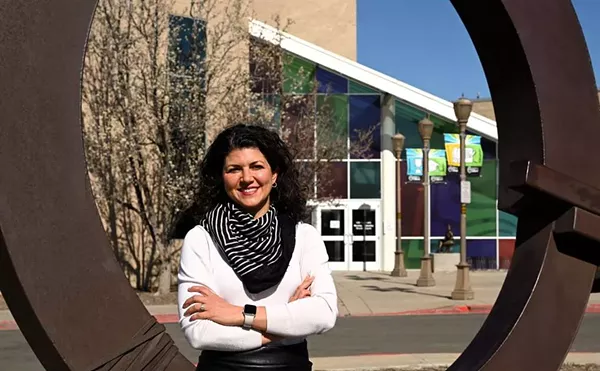If his nomination is confirmed by the Senate, perhaps Solano's first act (after removing all that silver-and-turquoise jewelry, that is; even Ben Nighthorse Campbell has toned down his Southwestern look) should be to clarify the guidelines governing federal bureaucrats' political activities. Earlier this month a fellow Coloradan-cum-Labor appointee, regional director Wilma Webb, had a starring role at a $250-per-person "Webb for Mayor" fundraiser. But even though Wilma's married to Wellington Webb, who may or may not be running for a third term as mayor, and even though the invite used her "First Lady" honorarium rather than her federal title, her participation was a technical violation of her own agency's rules.
The host of the posh Cherry Hills event, Morris Clark, knows all about bending labor rules. Under the city's minority contracting program, he owns a stake in the Colorado Parking Company, which provides parking services at Denver International Airport and has come under attack from its employees, many of them minorities themselves, for poor working conditions. Among their complaints: Clark, a dentist, didn't provide dental insurance. In fact, in the spring of 1995, a union-organizing drive became so contentious that the feds got involved--and weighed in against Clark and company.
Dear officer Krupski: Just when you thought the JonBenet Ramsey saga couldn't get any weirder, along comes another stunning revelation (and no, we're not talking about that alleged stun gun). On Tuesday, December 16, Boulder District Court Judge James Childress issued a temporary restraining order against Alli Krupski, the young Boulder Daily Camera reporter and Hayley Mills look-alike who'd covered the Ramsey case from the beginning. (Krupski was one of Boulder police chief Tom Koby's hand-picked questioners asking hand-picked questions at his touchy-feely press conference early last January.) Make that former Camera reporter--according to the paper, Krupski resigned December 9, taking with her documents and files worth more than $15,000. Childress granted the paper's request that Krupski be prohibited from selling or using the information, although judging from the Camera's tame Ramsey coverage over the past eleven months, there can't be $15,000 worth of scoop there.
Or on the paper's Web site, which offers this apology: "Maintenance of the Ramsey Archive has been getting lower priority lately. We hope to have everything cleaned up 'soon.'" Yeah, well, the Boulder cops are saying the same thing about their Ramsey investigation, which is now one year old.
Just in time for that grim anniversary, Sunday's Camera offered up a surprisingly mild profile of radio yakster Peter Boyles, with the expected criticism from Boulder officials, along with a more telling tidbit: Relatively few people in Boulder know who Boyles is, since "this is the kind of community that cites public radio when asked if they listen to talk radio."
Which also means it's the kind of community that should stay home, draw the drapes and pull the electronic plug as the international media floods the town this week.
Turn of the Scrooge: The Rocky Mountain News delivered a big lump of coal to Bill Gates's Microsoft last week. As part of a holiday thank-you to its supporters, Denver Sidewalk--Microsoft's online city guide edited by News alum Joe Rassenfoss--decided to put its gratitude on paper, running ads in Westword and the News. But after initially accepting the buy, last Wednesday the News told Microsoft it was pulling its ad for "competitive reasons." The cancellation came after Sidewalk had told its customers where the ads would appear--and almost too late to slip a replacement into the Denver Post. Fortunately, the Post, which refuses to let staffers write for competing online services, has no problem accepting such services' advertising dollars.
And by the by, it's swell that all those Post writers--Chuck Green, Woody Paige, Sue O'Brien--keep touting the Post's Season to Share campaign, but why hasn't anyone mentioned that there's no guarantee that the writer's particular pet charity will enjoy the paper's largesse? Here's how the deal works: Donations made to the Post--a quarter-million bucks by last weekend--are matched by the Robert McCormick Foundation in Chicago; then a committee of foundation and paper officials decides which of the agencies applying for the dough actually get a cut.











